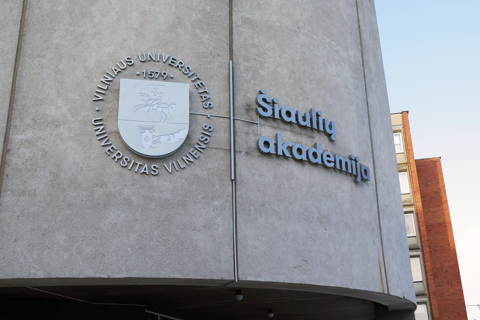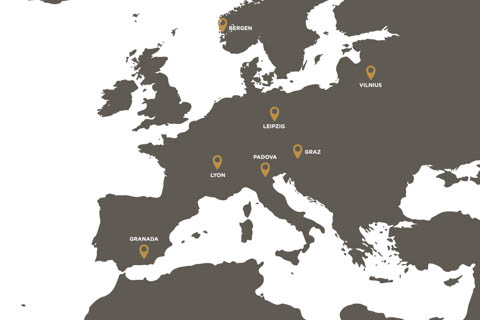 |
Faculty
Šiauliai Academy |
|

|
Scope of studies and length
210 ECTS credits, 3,5 years |
|

|
Qualification awarded
Bachelor in Economics |
|

|
Application deadline*
1 May / 1 July |
|

|
Language
English |
|

|
Tuition fee per year
3 540 € for non-EU students
3 176 € for EU students |
|

|
Start of studies
1 September
|
 |
City
Šiauliai |
APPLY NOW
This programme is designed to develop specialists in economics who are capable of solving present-day economic problems. We provide our students with a knowledge of economics, mathematics, management, finance, law, marketing, accounting and other key subjects. You will be able to analyse economic situations at a company, country and global level, as well as developing skills to assess and manage the finances of businesses, banks or in the public sphere.
Programme structure
| Subjects of study |
Credits |
|
Semester 1 Autumn |
| Compulsory Courses |
30.0 |
| English for Specific Purposes Proficient user level - C(1) |
5.0 |
| Fundamentals of Economics and Business |
5.0 |
| Fundamentals of Finance and Investment |
5.0 |
| Management |
5.0 |
| Marketing |
5.0 |
| Microeconomics I/II p. |
5.0 |
|
Semester 2 Spring |
| Compulsory Courses |
15.0 |
| Fundamentals of Accounting |
5.0 |
| Fundamentals of Data Analytics |
5.0 |
| Microeconomics II/II p. |
5.0 |
| Course unit (module) of Individual Studies |
15.0 |
|
Semester 3 Autumn |
| Compulsory Courses |
20.0 |
| Basics of Economic Research Methodology |
5.0 |
| Financial Analysis |
5.0 |
| Macroeconomics I/II p. |
5.0 |
| Statistics |
5.0 |
| Course unit (module) of Individual Studies |
10.0 |
|
Semester 4 Spring |
| Compulsory Courses |
15.0 |
| Investment Economics |
5.0 |
| Macroeconomics II/II p. |
5.0 |
| Public Finance |
5.0 |
| Course unit (module) of Individual Studies |
15.0 |
|
Semester 5 Autumn |
| Compulsory Courses |
25.0 |
| Econometrics |
5.0 |
| Economic Analysis |
5.0 |
| Financial Markets and Institutions |
5.0 |
| International Economics |
5.0 |
| Project Drafting |
5.0 |
| Course unit (module) of Individual Studies |
5.0 |
|
Semester 6 Spring |
| Compulsory Courses |
30.0 |
| Assessment of Financial Resilience |
5.0 |
| Business and Financial Risk Management |
5.0 |
| Financial Investments and FinTech |
5.0 |
| Green Economics |
5.0 |
| International Finance |
5.0 |
| The Project of Bachelor's Thesis |
5.0 |
|
Semester 7 Autumn |
| Compulsory Courses |
30.0 |
| Bachelor Final Thesis (Study field: Economics) |
10.0 |
| Data Analytics |
5.0 |
| Practical Training |
15.0 |
Programme Specific Requirements
- Motivational interview.
- Due to the differences in education systems in different countries, ŠA reserves the right to assess the applicant’s eligibility for studies individually and organise testing of the knowledge in Mathematics.
In addition, all applicants have to fulfil the general admission requirements.
Why choose this programme?
- The studies provide an all-round education in economics to ensure greater versatility. You will gain the competencies necessary for the development of your own business, or for working in a wide range of companies and institutions.
- With a variety of opportunities for internships and studies abroad, you will be able to spend up to 40% of your studies at foreign universities and you may complete your internship in a Lithuanian or an international company or organisation.
- Study specialisms provide you with the opportunity to choose from the fields of finance, banking and accounting, which allows you to adjust the path of your studies to match your career goals.
- In order to deepen your competencies, it is possible to choose modules from the two blocks of elective study subjects that are offered: Finance and Investments; and the Global Economy. Students can also choose to enrol in distance learning.
|
What comes after?
- You may become an economist or financial analyst. Having gained knowledge of micro and macro-economics, finance, investments and statistics, you will be ready to take on a position as an economist or financial analyst, responsible for forecasting economic indicators.
- You may establish your own business. Knowledge of economics, accounting, finance and marketing will enable you to make the best decisions, to set up and successfully develop your own business.
- You may become a public or private sector manager. A versatile economic education will allow you to take up a leading position in an institution in the public arena, as well as to manage a division of a private company.
|


